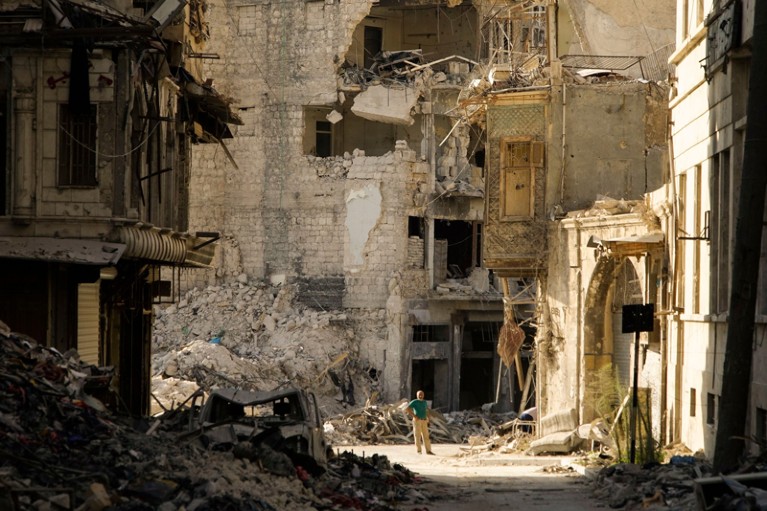
A man stands amid destruction in the streets of Aleppo, Syria. A civil war has driven many refugees out of the country.Credit: AP/Shutterstock
What prompted you to leave Syria?
I was working as a biochemist in the research and development team at a factory that produced baker’s yeast. The facility was situated between two opposing factions — the rebel fighters and the government — in Aleppo, the country’s largest city.
In June 2012, fighting broke out, and the city was carved up into sectors controlled by either group.
We could see sniper rifles poking out from buildings on either side of our factory, and we were bussed in and out of work every day for our safety — while bullets flew over our heads.
In January 2013, the fighting intensified. From inside the factory, my colleagues and I heard the sound of mortar fire, tanks and warplanes. We all ran to get home.
Soon after the fighting started, I visited my parents — and there was another bombing. I was injured by a blast and lost consciousness. I woke up in the hospital with shrapnel in my neck and head. My parents and I were lucky to have survived.
After that, I knew it was time to leave.
Describe your move to the United Kingdom.
After the bombing, I contacted academic institutes all over the world and asked if they had any positions available. But I did not receive any positive responses.
Finally, in 2014, I e-mailed the UK Council for At-Risk Academics (CARA) in London, and within six months, they had secured a year-long contract for me at the University of Nottingham to research the enrichment of yeast. I flew to the United Kingdom in September 2014, and my wife and two children joined me in April 2015.
I enjoyed the research, but the visa associated with the position was very limited. To apply for permanent residency in the country, I needed a new position. So in 2015, I joined the University of Southampton on a tier 2 visa, which is for workers with an offer for a skilled job. This meant I could apply for residency within five years.
At first, I continued to work on yeast research, but after my first contract expired, I needed a new position. Luckily, one of the university’s professors, Hasan Arshad, gave me the chance to try a new field and offered me two roles in his allergy research projects.
Tell us more about your new research field.
Each week, I split my time between two asthma research projects. At Southampton General Hospital, I’m a postdoctoral fellow identifying epigenetic markers that could help to identify how allergies develop.
I also travel to the Isle of Wight two days per week. There, I work on allergy studies as a clinical scientist. For example, we have just finished collecting samples from a cohort of 200 children at high risk of developing asthma, and will use these to better understand childhood asthma.
In addition, I won a grant from the Asthma, Allergy and Inflammation Research charity in Southampton, which will allow me to assess the correlation between immune cells and molecules in the blood and the development of asthma from birth to early childhood.
How was the research culture different between Syria and the United Kingdom?
Syria has an oppressive research culture. Other scientists view ambition and curiosity as a threat. There is no spirit of collaboration and support because others worry they could lose their position if you are successful.
In that environment, it is impossible to do good science. You can’t think freely without upsetting someone else.
When I arrived in the lab at Nottingham, I couldn’t immediately see any difference. But it’s not in the facilities — it’s in the mentality. I asked my supervisor, Chris Powell, a lecturer from the School of Biosciences, what I needed to work on. He told me to do whatever I wanted.
Within a few months, I was ready to publish my first paper, and I e-mailed Chris to ask whether he’d be a co-author. He thanked me for thinking of him, and I was amazed by his selflessness. In Syria, other scientists would expect to be credited if they helped you. UK research has an atmosphere of support and collaboration — that’s the difference.
Do you wish to return home?
Of course my wife and I, and our two eldest children who were born in Syria, miss our home. But we do not miss the violence. One night in our new country, my two older children heard fireworks and thought they were bombs. My youngest doesn’t have that problem. Everyone I knew in Syria who could find a way out has left now.


 ‘The world has never seen anything like this’: WHO chief on battling Ebola in a war zone
‘The world has never seen anything like this’: WHO chief on battling Ebola in a war zone
 Biochemistry in a conflict zone
Biochemistry in a conflict zone
 Lessons learnt from doing research amid a humanitarian crisis
Lessons learnt from doing research amid a humanitarian crisis





